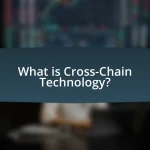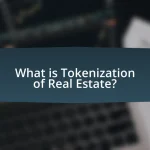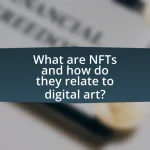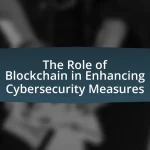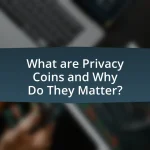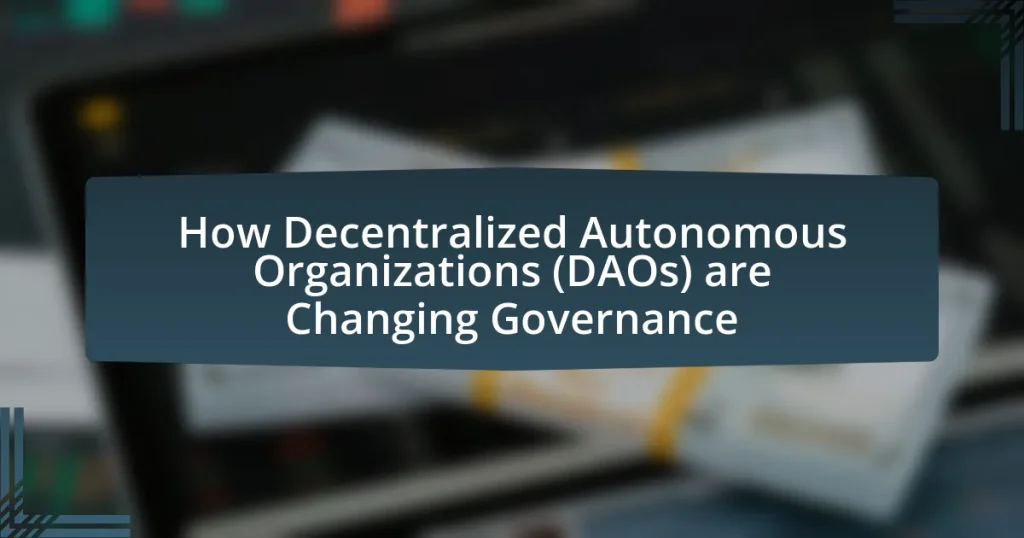Decentralized Autonomous Organizations (DAOs) represent a transformative approach to governance, utilizing blockchain technology and smart contracts to facilitate decentralized decision-making and community engagement. This article explores the operational mechanisms of DAOs, including their governance structures, the role of smart contracts, and the technologies that underpin them. It also examines the advantages DAOs offer over traditional organizations, such as enhanced transparency, inclusivity, and efficiency, while addressing the challenges they face, including regulatory compliance and voter participation. Furthermore, the article highlights successful examples of DAOs and discusses future trends and best practices for organizations looking to adopt DAO principles in their governance models.

What are Decentralized Autonomous Organizations (DAOs)?
Decentralized Autonomous Organizations (DAOs) are entities that operate through smart contracts on a blockchain, enabling governance and decision-making without centralized control. DAOs utilize blockchain technology to facilitate transparent and democratic processes, allowing members to vote on proposals and manage resources collectively. The first DAO, known as “The DAO,” was launched in 2016 and raised over $150 million in Ether, demonstrating the potential for decentralized governance. DAOs exemplify a shift in organizational structure, promoting inclusivity and reducing reliance on traditional hierarchical models.
How do DAOs function in the context of governance?
Decentralized Autonomous Organizations (DAOs) function in governance by enabling collective decision-making through smart contracts on a blockchain. Members of a DAO participate in governance by voting on proposals, which are executed automatically if they receive sufficient support, ensuring transparency and reducing the need for intermediaries. This model allows for a more democratic and efficient governance structure, as seen in DAOs like MakerDAO, which governs the DAI stablecoin through community voting on protocol changes and risk management.
What technologies underpin the operation of DAOs?
Decentralized Autonomous Organizations (DAOs) operate primarily on blockchain technology, which provides a secure and transparent ledger for transactions and governance. Smart contracts, which are self-executing contracts with the terms of the agreement directly written into code, facilitate automated decision-making and execution of rules within DAOs. Additionally, decentralized applications (dApps) enable user interaction with the DAO ecosystem, while tokenomics, involving the use of tokens for governance and incentivization, plays a crucial role in stakeholder engagement and voting processes. These technologies collectively ensure that DAOs function in a decentralized, transparent, and efficient manner.
How do smart contracts facilitate DAO governance?
Smart contracts facilitate DAO governance by automating decision-making processes and enforcing rules without the need for intermediaries. They execute predefined actions based on member votes or conditions, ensuring transparency and trust among participants. For instance, in a DAO, a smart contract can automatically allocate funds or implement changes based on the outcome of a voting process, which is recorded on the blockchain. This mechanism reduces the potential for manipulation and enhances accountability, as all actions are verifiable and immutable.
What are the key characteristics of DAOs?
Decentralized Autonomous Organizations (DAOs) are characterized by their decentralized governance, smart contract functionality, and community-driven decision-making. DAOs operate without a central authority, allowing members to participate in governance through token-based voting systems, which ensures that decisions reflect the collective will of the community. Smart contracts automate processes and enforce rules transparently, reducing the need for intermediaries. Additionally, DAOs promote inclusivity and transparency, as all transactions and decisions are recorded on a blockchain, providing verifiable accountability. These characteristics enable DAOs to innovate traditional governance structures by fostering collaboration and reducing bureaucratic inefficiencies.
How does decentralization impact decision-making in DAOs?
Decentralization significantly enhances decision-making in DAOs by distributing authority among all members rather than centralizing it in a single entity. This structure allows for a more democratic process where each participant can propose and vote on initiatives, leading to decisions that reflect the collective interests of the community. Research indicates that decentralized governance can improve transparency and accountability, as decisions are made openly and recorded on the blockchain, reducing the risk of corruption or bias. For instance, a study by the MIT Media Lab highlights that DAOs can achieve higher engagement and satisfaction among members due to their inclusive nature, which fosters a sense of ownership and responsibility in the decision-making process.
What role does community participation play in DAOs?
Community participation is essential in Decentralized Autonomous Organizations (DAOs) as it empowers members to influence decision-making processes and governance structures. This participatory model ensures that all stakeholders have a voice, fostering transparency and accountability. Research indicates that DAOs often rely on voting mechanisms where community members propose and vote on initiatives, thereby directly shaping the organization’s direction. For instance, in the MakerDAO, community members actively engage in governance by voting on proposals that affect the stability of the DAI stablecoin, illustrating how collective input can lead to informed and democratic outcomes.
Why are DAOs considered a revolutionary approach to governance?
DAOs are considered a revolutionary approach to governance because they enable decentralized decision-making through smart contracts and blockchain technology. This structure allows for transparency, accountability, and inclusivity, as all members can participate in governance without the need for a central authority. For instance, the Ethereum-based DAO raised over $150 million in 2016, demonstrating the potential for collective funding and decision-making. This shift from traditional hierarchical models to decentralized frameworks empowers individuals and fosters innovation in governance practices.
How do DAOs challenge traditional governance structures?
Decentralized Autonomous Organizations (DAOs) challenge traditional governance structures by enabling decentralized decision-making and eliminating the need for centralized authority. Unlike conventional organizations that rely on hierarchical management, DAOs operate through smart contracts on blockchain technology, allowing members to participate directly in governance through voting mechanisms. This shift empowers individuals and promotes transparency, as all transactions and decisions are recorded on a public ledger, reducing the potential for corruption and mismanagement. The rise of DAOs has been evidenced by their increasing adoption in various sectors, with notable examples like MakerDAO and Aragon, which demonstrate how decentralized governance can function effectively without traditional intermediaries.
What advantages do DAOs offer over conventional organizations?
DAOs offer several advantages over conventional organizations, primarily through decentralization, transparency, and efficiency. Decentralization allows for distributed decision-making, reducing the concentration of power and enabling broader participation from stakeholders. Transparency is inherent in DAOs, as all transactions and governance decisions are recorded on a blockchain, fostering trust among participants. Additionally, DAOs often operate with lower overhead costs due to the absence of traditional hierarchical structures, which can lead to faster decision-making processes and increased adaptability to change. These characteristics collectively enhance stakeholder engagement and promote a more democratic governance model.

How are DAOs influencing modern governance models?
Decentralized Autonomous Organizations (DAOs) are influencing modern governance models by enabling decentralized decision-making and enhancing transparency. DAOs operate on blockchain technology, allowing stakeholders to participate in governance through token-based voting systems, which reduces the concentration of power typically seen in traditional governance structures. For instance, the DAO framework allows for real-time proposals and voting, fostering a more democratic process where every member’s voice can be heard. This shift is evidenced by the rise of DAOs like MakerDAO and Aragon, which have successfully implemented decentralized governance, demonstrating increased engagement and accountability among participants.
What changes are DAOs bringing to organizational transparency?
DAOs are significantly enhancing organizational transparency by utilizing blockchain technology to record all transactions and decisions in an immutable ledger. This transparency allows stakeholders to access real-time information about governance processes, financial transactions, and decision-making activities, which were often opaque in traditional organizations. For instance, a study by the World Economic Forum highlights that DAOs enable participatory governance, where every member can view and verify actions taken by the organization, fostering trust and accountability. This shift not only democratizes access to information but also empowers members to engage actively in governance, thereby transforming the traditional hierarchical structures into more open and collaborative frameworks.
How does blockchain technology enhance transparency in DAOs?
Blockchain technology enhances transparency in Decentralized Autonomous Organizations (DAOs) by providing an immutable and publicly accessible ledger of all transactions and decisions. This transparency allows all stakeholders to verify actions taken within the DAO, ensuring accountability and trust among participants. For instance, every vote, proposal, and financial transaction is recorded on the blockchain, making it impossible to alter past records without consensus from the network. This feature not only deters fraudulent activities but also fosters a culture of openness, as members can independently audit the DAO’s operations at any time.
What are the implications of transparency for stakeholder trust?
Transparency significantly enhances stakeholder trust by fostering open communication and accountability. When organizations, particularly Decentralized Autonomous Organizations (DAOs), operate transparently, stakeholders can easily access information regarding decision-making processes, financial transactions, and governance structures. This accessibility reduces uncertainty and builds confidence among stakeholders, as they feel informed and involved in the organization’s activities. Research indicates that organizations with high transparency levels experience increased stakeholder engagement and loyalty, as evidenced by a study published in the Journal of Business Ethics, which found that transparency correlates positively with trust and satisfaction among stakeholders.
In what ways do DAOs promote inclusivity in governance?
DAOs promote inclusivity in governance by enabling decentralized decision-making, allowing all stakeholders to participate equally in the governance process. This structure reduces barriers to entry, as individuals can engage without needing to hold significant power or resources, fostering a more diverse range of voices and perspectives. Additionally, DAOs often utilize transparent voting mechanisms, such as token-based voting, which ensure that every participant’s opinion is counted and visible, further enhancing accountability and inclusivity. Research indicates that this model can lead to more equitable outcomes, as it empowers marginalized groups who may otherwise be excluded from traditional governance systems.
How do DAOs enable broader participation in decision-making?
DAOs enable broader participation in decision-making by utilizing blockchain technology to create transparent and decentralized governance structures. This allows all stakeholders to have a voice in the decision-making process, as voting rights are typically distributed among token holders, ensuring that decisions reflect the collective input of the community rather than a centralized authority. For instance, in a DAO, proposals can be submitted by any member, and the community votes on these proposals, which fosters inclusivity and democratizes governance. This model has been evidenced by successful DAOs like MakerDAO, where token holders actively participate in governance decisions, demonstrating the effectiveness of decentralized participation.
What barriers to entry do DAOs help to eliminate?
DAOs help to eliminate barriers to entry such as high costs of participation, centralized control, and lack of transparency. By utilizing blockchain technology, DAOs enable individuals to participate in governance and decision-making processes without the need for significant financial investment or traditional hierarchical structures. This democratization of access allows a broader range of participants to engage in governance, as evidenced by the increasing number of DAOs that operate with minimal fees and open membership policies, fostering inclusivity and diverse participation.
What challenges do DAOs face in governance?
DAOs face significant challenges in governance, primarily due to issues of decision-making efficiency, voter participation, and regulatory compliance. Decision-making can be slow and cumbersome because consensus mechanisms often require extensive discussions and votes, which can hinder timely actions. Voter participation is another challenge, as many token holders may not engage in governance processes, leading to decisions being made by a small, active minority. Additionally, DAOs must navigate complex regulatory landscapes, as their decentralized nature can conflict with existing legal frameworks, creating uncertainty and potential legal risks. These challenges highlight the difficulties DAOs encounter in establishing effective governance structures.
How do legal and regulatory issues affect DAOs?
Legal and regulatory issues significantly impact Decentralized Autonomous Organizations (DAOs) by influencing their operational frameworks and compliance requirements. DAOs often face challenges related to jurisdiction, as they operate across borders, which complicates adherence to varying legal standards. For instance, the lack of clear legal recognition in many jurisdictions can lead to uncertainty regarding liability and governance structures, potentially exposing members to legal risks. Additionally, regulatory scrutiny concerning securities laws can affect fundraising mechanisms, as seen in cases where tokens issued by DAOs were classified as securities, prompting compliance with stringent regulations. This regulatory landscape shapes how DAOs design their governance models and operational protocols to mitigate legal risks and ensure sustainability.
What are the risks associated with DAO governance models?
The risks associated with DAO governance models include centralization of power, security vulnerabilities, and lack of regulatory clarity. Centralization can occur when a small group of token holders or developers disproportionately influence decisions, undermining the democratic principles of DAOs. Security vulnerabilities arise from potential coding errors or exploits that can lead to significant financial losses, as evidenced by incidents like the DAO hack in 2016, which resulted in the loss of $60 million worth of Ether. Additionally, the lack of regulatory clarity can expose DAOs to legal challenges, as existing laws may not adequately address their unique structures and operations, creating uncertainty for participants and investors.

What are the future prospects of DAOs in governance?
The future prospects of Decentralized Autonomous Organizations (DAOs) in governance are promising, as they offer a novel framework for decentralized decision-making and community engagement. DAOs enable stakeholders to participate directly in governance processes through smart contracts and blockchain technology, which enhances transparency and accountability. The increasing adoption of blockchain technology and the growing demand for decentralized solutions in various sectors, including finance, supply chain, and social governance, further support the potential of DAOs. According to a report by the World Economic Forum, by 2025, 10% of global GDP could be stored on blockchain technology, indicating a significant shift towards decentralized governance models.
How might DAOs evolve in the coming years?
DAOs are likely to evolve towards greater integration with traditional governance structures and enhanced regulatory compliance. As the demand for transparency and accountability increases, DAOs may adopt hybrid models that combine decentralized decision-making with established legal frameworks. This evolution is supported by the growing interest from institutional investors and governments in blockchain technology, which encourages the development of standards and best practices for DAOs. Additionally, advancements in smart contract technology will enable more complex governance mechanisms, allowing DAOs to manage larger and more diverse communities effectively.
What trends are emerging in the DAO landscape?
Emerging trends in the DAO landscape include increased regulatory scrutiny, the rise of hybrid DAOs, and enhanced governance mechanisms. Regulatory scrutiny is growing as governments seek to understand and potentially regulate DAOs, impacting their operational frameworks. Hybrid DAOs, which combine elements of traditional governance with decentralized models, are gaining traction as they offer flexibility and scalability. Enhanced governance mechanisms, such as quadratic voting and token-weighted voting, are being adopted to improve decision-making processes and ensure more equitable participation among members. These trends reflect the evolving nature of DAOs as they adapt to challenges and opportunities in the governance landscape.
How could technological advancements shape the future of DAOs?
Technological advancements could significantly shape the future of Decentralized Autonomous Organizations (DAOs) by enhancing their scalability, security, and governance mechanisms. Innovations such as blockchain interoperability, improved smart contract functionality, and decentralized identity solutions will enable DAOs to operate more efficiently and securely. For instance, advancements in blockchain technology, like Ethereum 2.0, aim to increase transaction throughput and reduce costs, which directly benefits DAOs by allowing them to handle larger volumes of transactions and interactions. Additionally, the integration of artificial intelligence can facilitate more sophisticated decision-making processes within DAOs, enabling them to adapt to changing environments and member needs more effectively. These advancements collectively contribute to a more robust framework for DAOs, fostering greater participation and trust among stakeholders.
What lessons can be learned from existing DAOs?
Existing DAOs demonstrate the importance of transparency and community engagement in governance. For instance, successful DAOs like MakerDAO and Aragon have shown that clear communication and open decision-making processes foster trust among members, leading to higher participation rates. Additionally, DAOs highlight the necessity of robust governance frameworks; those with well-defined rules and voting mechanisms tend to operate more efficiently and adapt to challenges more effectively. The experience of these organizations illustrates that inclusivity in decision-making can enhance innovation and resilience, as diverse perspectives contribute to more comprehensive solutions.
What successful examples of DAOs can inform future governance?
Successful examples of DAOs that can inform future governance include MakerDAO, which governs the DAI stablecoin through a decentralized voting system, and Aragon, which provides tools for creating and managing DAOs with a focus on governance and decision-making. MakerDAO has demonstrated effective governance by allowing token holders to vote on key decisions, such as risk parameters and collateral types, resulting in a stable and resilient financial ecosystem. Aragon has empowered various organizations to implement decentralized governance structures, showcasing flexibility and adaptability in decision-making processes. These examples illustrate how DAOs can enhance transparency, community engagement, and efficiency in governance.
How can failures of DAOs provide insights for improvement?
Failures of Decentralized Autonomous Organizations (DAOs) can provide insights for improvement by highlighting systemic weaknesses and governance flaws. For instance, the failure of the DAO in 2016, which resulted in a significant loss of funds due to a vulnerability in its smart contract, underscored the importance of rigorous code audits and security measures. This incident led to the development of better practices in smart contract programming and increased emphasis on community governance structures to prevent similar issues. Additionally, analyzing the reasons behind DAO failures can inform the design of more resilient governance frameworks, ensuring that decision-making processes are transparent and inclusive, thereby enhancing overall organizational effectiveness.
What practical steps can organizations take to implement DAO principles?
Organizations can implement DAO principles by establishing a decentralized governance structure that empowers stakeholders through token-based voting mechanisms. This involves creating a transparent framework where decisions are made collectively, ensuring that all participants have a voice proportional to their stake. Additionally, organizations should utilize smart contracts to automate processes and enforce rules without the need for intermediaries, enhancing efficiency and trust. Implementing a clear communication channel for community engagement and feedback is also essential, as it fosters collaboration and aligns the interests of all members. These steps are supported by the growing trend of DAOs in various sectors, demonstrating their effectiveness in promoting democratic governance and operational transparency.
How can organizations transition to a DAO model effectively?
Organizations can transition to a DAO model effectively by implementing a clear governance framework that defines roles, responsibilities, and decision-making processes. This involves establishing smart contracts on a blockchain to automate operations and ensure transparency. Additionally, organizations should engage stakeholders in the transition process to foster a sense of ownership and collaboration. Research indicates that successful DAO transitions often include gradual shifts from traditional structures, allowing for iterative learning and adaptation. For instance, the DAO known as MakerDAO has successfully integrated community governance through token-based voting, demonstrating the effectiveness of stakeholder involvement in decision-making.
What best practices should be followed when establishing a DAO?
When establishing a Decentralized Autonomous Organization (DAO), best practices include defining clear governance structures, ensuring transparency in decision-making, and implementing robust security measures. Clear governance structures facilitate effective participation and accountability among members, as evidenced by successful DAOs like MakerDAO, which utilizes a well-defined voting system. Transparency in decision-making fosters trust and engagement, as seen in DAOs that publish all proposals and voting results on public platforms. Additionally, robust security measures, such as regular audits and smart contract reviews, are crucial to protect against vulnerabilities, as highlighted by incidents in the DAO space where security breaches led to significant losses.
It is not possible to provide an answer to the question “
” as it does not contain a specific inquiry or context related to the topic of how Decentralized Autonomous Organizations (DAOs) are changing governance.
